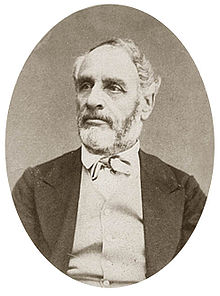Louis Charles Delescluze
| Louis Charles Delescluze | |
|---|---|
 |
|
| Born |
October 2, 1809 Dreux, Eure-et-Loir |
| Died | May 25, 1871 (aged 61) Barricade on Place du Château d'Eau |
| Nationality | French |
| Occupation | Revolutionary, Journalist, Military commander |
| Known for | Leading the Paris Commune |
Louis Charles Delescluze (2 October 1809 – 25 May 1871) was a French revolutionary leader, journalist, and military commander of the Paris Commune.
He was born at Dreux, Eure-et-Loir. He studied law in Paris, and became a member of several secret republican societies, and took part in July revolution of 1830 which overthrew the Bourbon monarchy and placed King Louis-Philippe in power. He became a member of various secret republican societies, and in 1836 he was forced to take refuge in Belgium, where he devoted himself to republican journalism.
He returned to France in 1840 and settled in Valenciennes. After the revolution of 1848, which toppled Louis-Philippe and created the Second French Republic, he moved to Paris, where he started a newspaper called La Révolution démocratique et sociale (The Democratic and Social Revolution), and founded revolutionary organization called Solidarité républicaine. In June 1848 he other revolutionaries made a failed attempt to overthrow the government of the new Republic, which was swiftly and violently repressed by the army under General Louis-Eugène Cavaignac In March 1849 he was arrested and sentenced to one year in prison for criticizing Cavaignac. He was arrested again in April 1850, and sentenced to three years in prison; he fled from France to England. He returned secretly to France in 1853, but was arrested and condemned to ten years of prison and exile. He served his sentence at the prisons of Saint-Pelagie, Belle-Île, Carte and finally at Devil's Island in French Guiana. Throughout his six-year imprisonment, he composed a memoir that was in 1869 published in Paris as De Paris à Cayenne, Journal d'un transporté.
1859, he and other political prisoners were amnestied by Emperor Napoleon III and November 1860 he returned to France, weakened by illness. His next venture was the publication of the Réveil, a radical newspaper supporting the new socialist International Workingmen's Association, which was founded in 1864. This journal brought him three condemnations, fine and imprisonment in one year, was finally suppressed; and he again fled to Belgium.
...
Wikipedia
